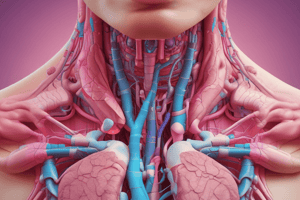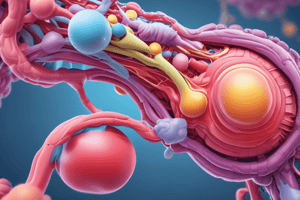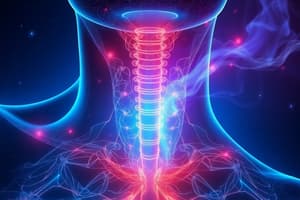Podcast
Questions and Answers
Which symptom is NOT commonly associated with hypothyroidism?
Which symptom is NOT commonly associated with hypothyroidism?
- Sensitivity to heat (correct)
- Fatigue
- Memory problems
- Weight gain despite a normal or reduced calorie intake
What can be a consequence of hypothyroidism if left untreated?
What can be a consequence of hypothyroidism if left untreated?
- Increased heart rate
- Excessive sweating
- High energy levels
- Osteoporosis (correct)
What is the most common cause of hypothyroidism?
What is the most common cause of hypothyroidism?
- Iodine deficiency
- Pituitary gland dysfunction
- Hashimoto's thyroiditis (correct)
- Thyroid surgery
What is the most common medication used to treat hypothyroidism?
What is the most common medication used to treat hypothyroidism?
How do healthcare professionals typically diagnose hypothyroidism?
How do healthcare professionals typically diagnose hypothyroidism?
Which lifestyle change is NOT recommended for supporting thyroid health?
Which lifestyle change is NOT recommended for supporting thyroid health?
What complication of hypothyroidism increases the risk of heart disease?
What complication of hypothyroidism increases the risk of heart disease?
What type of nerve damage is associated with untreated hypothyroidism?
What type of nerve damage is associated with untreated hypothyroidism?
Which hormone plays a role in helping the body produce the right amount of T3?
Which hormone plays a role in helping the body produce the right amount of T3?
What is the primary aim of synthetic thyroid hormone replacement therapy?
What is the primary aim of synthetic thyroid hormone replacement therapy?
Flashcards are hidden until you start studying
Study Notes
Hypothyroidism: Unraveling the Complexities of Thyroid Dysfunction
Hypothyroidism is a medical condition where the thyroid gland produces insufficient amounts of thyroid hormones, leading to a slower metabolism and a range of symptoms that can negatively impact an individual's health. In this article, we will explore the causes, symptoms, diagnosis, complications, and treatment options of hypothyroidism.
Causes
Hypothyroidism can stem from various factors, such as autoimmune disorders, iodine deficiency, thyroid surgery, radiation therapy, certain medications, or pituitary gland dysfunction. The most common cause is Hashimoto's thyroiditis, an autoimmune disorder where the immune system mistakenly attacks the thyroid gland.
Symptoms
The symptoms of hypothyroidism can be subtle and nonspecific, often taking years to develop. They include:
- Fatigue
- Weight gain despite a normal or reduced calorie intake
- Cold intolerance
- Dry skin
- Hair loss
- Constipation
- Muscle weakness or pain
- Slowed heart rate
- Memory problems
- Depression
- Menstrual irregularities
- Puffy face
- Hoarseness
Diagnosis
To diagnose hypothyroidism, healthcare professionals use blood tests to measure the levels of thyroid-stimulating hormone (TSH) and thyroid hormones, such as T3 and T4. An elevated TSH level and low T3 or T4 levels are indicative of hypothyroidism.
Complications
If left untreated, hypothyroidism can lead to a range of complications, including:
- High cholesterol levels, increasing the risk of heart disease
- High blood pressure
- Joint pain and stiffness
- Peripheral neuropathy (nerve damage)
- Goiter (enlarged thyroid gland)
- Infertility and miscarriage
- Hypothyroidism-related depression
Treatment
Hypothyroidism is typically treated with synthetic thyroid hormone replacement therapy, which aims to restore normal hormone levels. The most common medication is levothyroxine (T4), which helps the body produce the right amount of T3. Patients take a daily dose of levothyroxine, and blood tests are carried out periodically to ensure optimal hormone levels.
For some individuals, especially those with genetic factors affecting levothyroxine absorption or those seeking an alternative to levothyroxine, liothyronine (T3) or a combination of T3 and T4 (such as liotrix or levoxyl) may be prescribed.
Treatment success depends on accurate diagnosis, appropriate medication dosage, and regular blood tests to monitor hormone levels. Once thyroid hormone levels are maintained within a normal range, most patients experience symptom relief and reduced risk of complications.
Lifestyle Changes
In addition to medication, patients are encouraged to make lifestyle changes to support their thyroid health:
- Eat a balanced, nutrient-rich diet, including iodine-rich foods such as seafood, dairy, and iodized salt.
- Exercise regularly to boost metabolism and maintain a healthy weight.
- Avoid excessive caffeine and alcohol consumption, as they can interfere with thyroid hormone metabolism.
- Get enough sleep, as sleep has a direct impact on thyroid hormone production.
- Manage stress through relaxation techniques such as yoga, meditation, or deep breathing exercises.
Hypothyroidism can be a challenging condition to manage, but with the right treatment and lifestyle changes, patients can live healthy, symptom-free lives. It is vital to work closely with a healthcare professional to diagnose and treat hypothyroidism effectively.
Studying That Suits You
Use AI to generate personalized quizzes and flashcards to suit your learning preferences.




